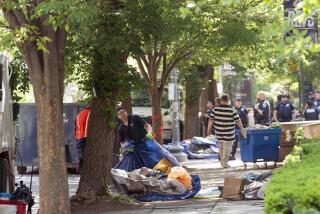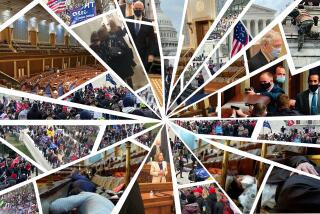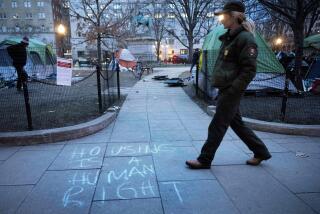Washington Suffocates for Sake of Security, City Officials Argue
- Share via
WASHINGTON — As a target for terrorists, the nation’s capital is at the top of the list, a city of such world-famous symbols of political and economic might as the White House, the Capitol and the World Bank.
But in the eyes of local officials, security-obsessed federal authorities may kill the city before America’s enemies get the chance.
Furious at the latest street closings and checkpoints, imposed by Senate edict Monday night, city officials took to the streets Tuesday to express their outrage that congressional law enforcement officials were turning Washington into a fortress without regard for the people who live and work there -- or the officials elected to govern it.
“We concede this certainly makes it easier for security,” Eleanor Holmes Norton, the District of Columbia’s congressional representative, said as she stood on 1st Avenue N.E., now closed between the Capitol and Union Station. “You want to really make it easier? Close down all the streets! Close down the city! You can make it real safe.”
A member of the Homeland Security Committee, Norton emphasized her commitment to fighting terrorism. “I recognize this is perhaps the highest-target city in the world,” said Norton, a Democrat who serves on committees but is not entitled to vote on the House floor because the District of Columbia is not a state. “But we have to remember that we are fighting to preserve security and freedom, not one or the other.”
Washington Mayor Anthony Williams, a normally low-key former accountant, raised his voice when meeting with reporters Tuesday.
“This is a living, breathing city; this isn’t just a dead, static piece of concrete,” he said, straining to be heard above the noise of an ambulance siren a block away. “We can’t continue to close streets without doing death to commerce in this city, to tourism in this city, to a tax base in this city that provides all the services people need.... If someone hiccups in this city, traffic already backs up into Maryland and Virginia. You start closing streets like this, it will be backed up to Delaware.”
Part of the anger comes from the city’s efforts to recover from the terrorist attacks of Sept. 11, which killed 189 people at the Pentagon and devastated the city’s tourism industry.
“We worked so ... hard to get the city’s economy back up after Sept. 11, against all these obstacles,” Williams said, referring to the lengthy shutdown of Ronald Reagan Washington National Airport and the shuttering of the White House and the Capitol to visitors that finally yielded, this year, to a tourist turnaround.
“Now here we are reversing ground again. Yeah, it makes me angry,” he said.
Last week, Williams and other city officials were at the Democratic National Convention, dumping tea in Boston Harbor to protest their status as a city that paid taxes but had no vote in Congress.
That status is unlikely to change as long as Republicans are in charge on Capitol Hill, where the District of Columbia’s historically liberal politics would probably mean two more Democratic votes in the Senate and one in the House.
“To me, this feels like another glaring manifestation of lack of representation,” Williams said. “If we had two senators representing the district ... there is no way they would just do this.”
Sharon Ambrose, the city councilwoman who represents the Capitol Hill area, was even more suspicious of federal motives. Noting Sunday’s decision by the Department of Homeland Security to raise the terrorist threat alert here from “yellow” (elevated) to “orange” (high), she accused congressional leaders of using “a sneak attack in the dead of night, under an orange blanket,” to “do something they wanted to do for several years.”
Congressional officials acknowledged Tuesday that they had long wanted to close 1st Street N.E. between Constitution Avenue and D Street, which allows traffic to pass by the Dirksen and Russell Senate Office Buildings.
“Yes, the Senate leadership made a deliberate decision to close 1st Street, based on intelligence and the advice of security officials,” Senate Sergeant-at-Arms William Pickle said in an interview.
“We discussed it for several weeks. We had to speed it up because of the orange alert.”
Agreeing with city officials that “no one likes closing streets,” Pickle said that congressional leaders opted to “err on the side of safety, to ensure the institution survives.”
Still, the symbolism of Washington’s city officials ruffled by federal edict -- and by traffic jams around Capitol Hill -- was lost on no one, particularly in a week when New Yorkers showcased a seemingly united front. New York City authorities banned commercial traffic on several bridges and from the inbound Holland Tunnel and conducted random searches of vans and service vehicles. Amid planning for the Republican National Convention at the end of the month and increasing security at the perimeter of Wall Street, city officials also reopened the Statue of Liberty on Tuesday -- at least its pedestal.
Elsewhere in Washington, city police instituted heightened security measures around the World Bank and the International Monetary Fund, cited by Homeland Security officials in their alert Sunday, and the Bureau of Engraving and Printing and the Federal Reserve buildings. The mayor had no comment about those measures. But Norton did.
Asked if the orange alert was politically motivated by the Bush administration to increase voter concern about terrorism, Norton dismissed the idea. “In the District of Columbia we can’t afford to speculate that maybe it’s politics and maybe it’s not,” she said. “We’ve got a whole city to defend here.... We’re not going to second-guess them. But they sure are second-guessing us.”
Privately, city officials scoffed at federal explanations. One observer noted that after a farmer drove his tractor into a pond on the National Mall in a 2003 protest over reduced tobacco subsidies -- and sat there for two workdays -- federal law enforcement officials diverted traffic, snarling commutes. Publicly, city officials raised the concern that new traffic jams radiating from the Capitol to all parts of the city could impede emergency trips to the hospital or swift reaction by first responders to a terrorist attack.
Mostly, they expressed anguish that, once again, federal officials had ignored the city’s autonomy and its interests.
“They are turning what are supposed to be symbols of democracy -- the Capitol, the Library of Congress, the Supreme Court -- into a fortress of fear,” Tony Bullock, the mayor’s press secretary, said.
“That sends entirely the wrong message. It’s just wrong. It’s the wrong optics. It looks like a war zone.”
More to Read
Sign up for Essential California
The most important California stories and recommendations in your inbox every morning.
You may occasionally receive promotional content from the Los Angeles Times.













